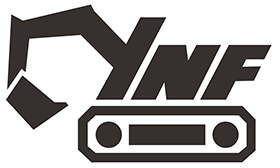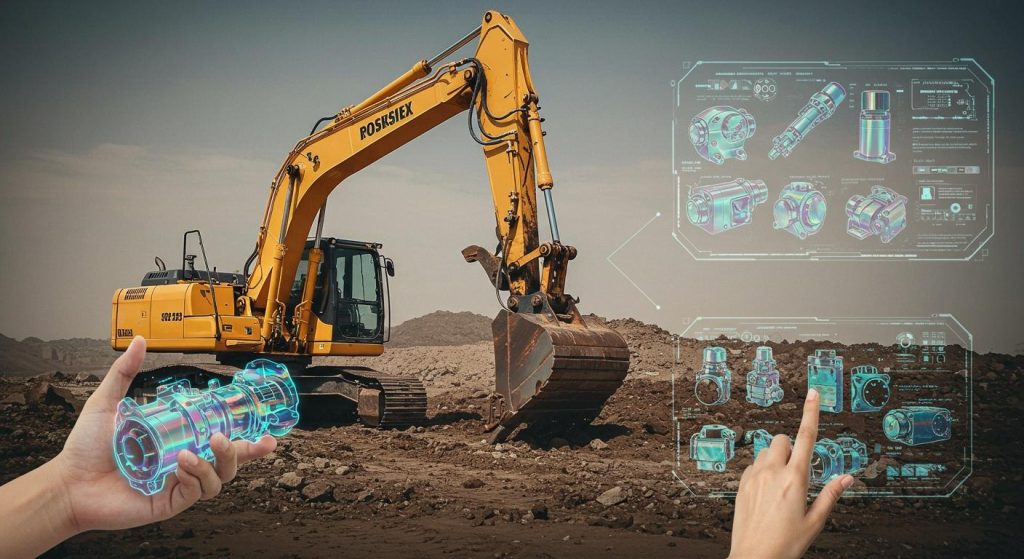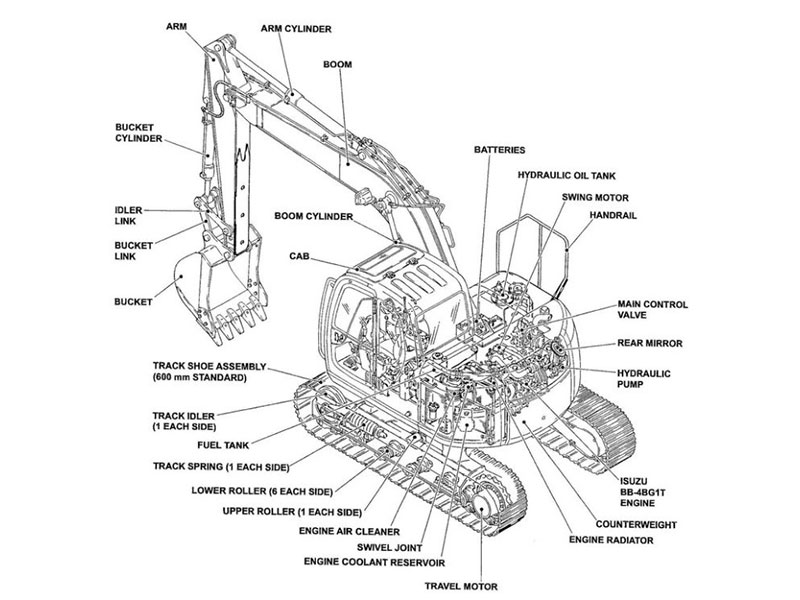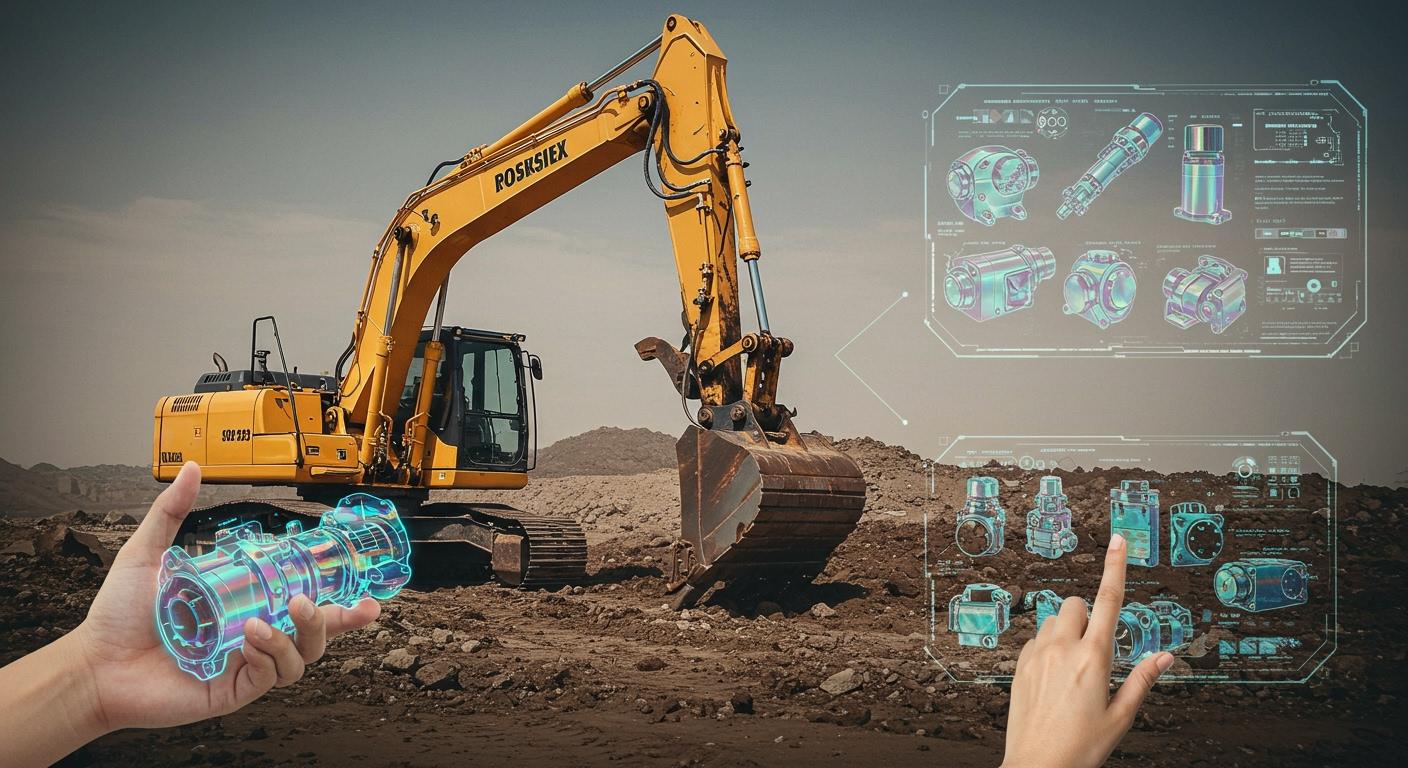
When selecting an excavator hydraulic pump, it’s important to consider the price excavator hydraulic pump options available. Make sure you choose the right type by matching the pump’s features to your machine’s requirements. Always check the oil flow and pressure rating to ensure your equipment operates safely and efficiently. Using the wrong pump can damage your machine, so verify that the pump fits your excavator. Many people overlook the work environment and regular maintenance, which are also crucial factors.
Tip: Always compare the price excavator hydraulic pump before making a purchase, and confirm it is compatible with your machine.
Key Takeaways
Make sure the hydraulic pump’s flow rate fits your excavator. Match the pressure to what your machine needs. This helps keep things safe and working well.
Think about which hydraulic pump works best for your job. Piston pumps are strong and good for tough work. Gear pumps are easy to use and not expensive. Vane pumps give you good performance and balance.
Take care of your pump often. Check the oil levels to keep it running. Change seals when needed. Watch for leaks so your pump lasts longer.
Look at both the starting price and future costs. A better pump might cost more at first. But it can help you save money on repairs later.
Make sure the pump works with your excavator‘s brand and model. Using the wrong pump can cause problems. It may also lead to expensive repairs.
Excavator Hydraulic Pump Basics
Pump Function
You rely on the excavator hydraulic pump to power your machine’s most important movements. This pump pushes oil through the hydraulic lines, making sure each part gets the energy it needs. When you move the controls, the pump sends pressurized oil to the cylinders. This action lets you lift, lower, or swing the arm and bucket. Without a steady flow of oil, your excavator cannot work properly.
The hydraulic pump keeps oil moving through the system.
It controls the movement of the arm and bucket by sending oil to the right cylinders.
The pump provides a constant flow of pressurized oil, which is vital for all working parts.
Tip: Always check the oil level and pressure before starting work. This simple step helps you avoid damage and keeps your machine running smoothly.
Why Selection Matters
Choosing the right hydraulic pump affects how well your excavator works and how long it lasts. The pump must deliver the correct flow and pressure for your machine. If you pick the wrong one, your excavator may lose power or even break down. Each type of hydraulic pump, such as gear, vane, or piston, works best in certain situations. For example, some pumps handle tough jobs in wetlands or swamps better than others.
The hydraulic pump controls the flow and pressure, which impacts performance and efficiency.
Different pumps have unique features that suit different tasks and environments.
In special jobs, like working in water or mud, the hydraulic system faces extra stress.
A strong and reliable pump keeps your excavator working, even in harsh places.
The right selection helps your machine last longer and reduces downtime.
Note: Always match the pump to your excavator’s needs. This careful selection saves money and prevents costly repairs.
Hydraulic Pump Types
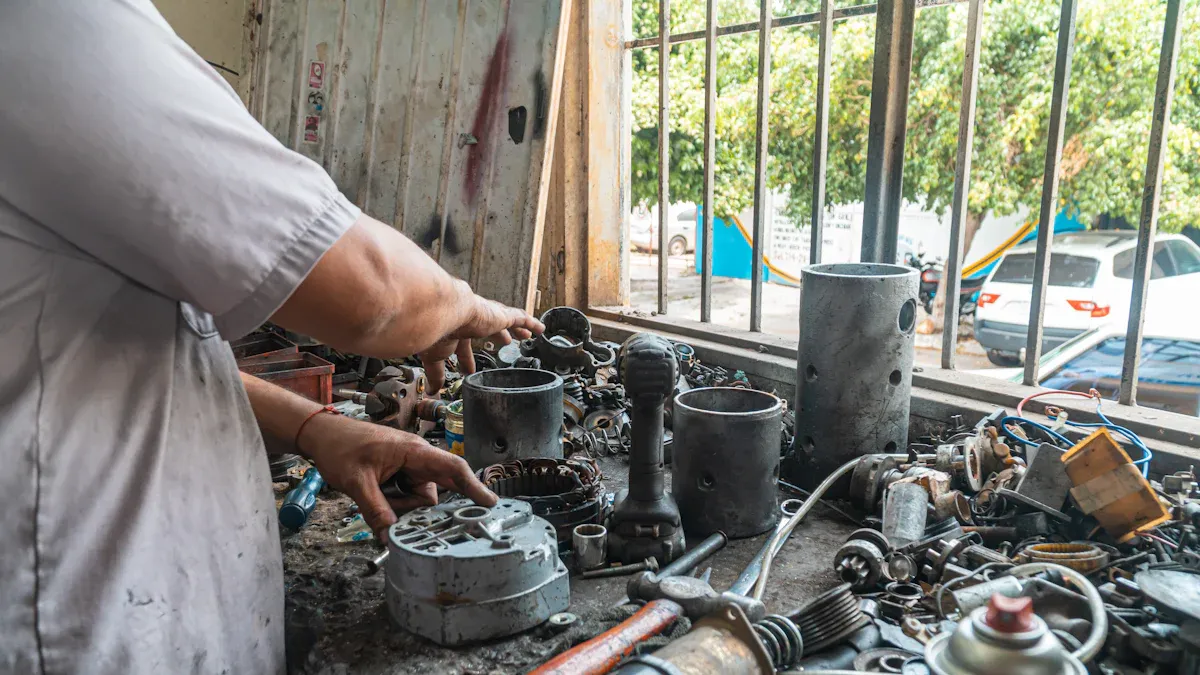
There are three main hydraulic pump types for excavators. These are piston pumps, gear pumps, and vane pumps. Each type is best for certain jobs and machines. The table below compares these pumps. It shows pressure, efficiency, complexity, and common uses.
Pump Type | Pressure Capability | Efficiency | Complexity | Applications |
|---|---|---|---|---|
Gear Pumps | Low-to-medium (up to 200 bar) | Moderate | Simple | Agricultural machinery, construction equipment |
Piston Pumps | High (exceeding 400 bar) | High | Complex | Heavy construction machinery, aerospace systems |
Vane Pumps | Moderate (up to 200 bar) | Moderate | Moderate | Automotive systems, plastic injection molding machines |
Piston Pumps
Piston pumps are used in big excavators. They can handle high pressure and give good control. These pumps work with many fluids and last a long time. Here are some good things about piston pumps:
They can handle high pressure.
They give you good control of fluid flow.
They work with many kinds of fluids.
They are very efficient.
They last a long time.
But piston pumps also have some problems:
They need regular maintenance.
They can be noisy and shake.
They are hard to fix.
They do not move as much fluid as some other pumps.
They might leak sometimes.
Piston pumps cost more because they are complex and need more care. They are good for tough jobs and heavy loads. If you need a strong pump for hard work, piston pumps are a good choice.
Gear Pumps
Gear pumps are simple hydraulic pumps. You see them in many excavators. They are easy to take care of and cost less. These pumps can reach up to 3,000 psi. This is enough for many machines. Gear pumps are good for basic construction and farming. They are not hard to fix because they have fewer parts.
Tip: If you want a pump that is easy to fix and works for most jobs, gear pumps are a smart pick.
Vane Pumps
Vane pumps give medium pressure and efficiency. You find them in machines that do not need high pressure. These pumps have more parts than gear pumps. So, they need more care. Vane pumps can do harder jobs than gear pumps. But they may cost more to keep working. If your job is not too hard, vane pumps can save you money.
Vane pumps can handle more pressure than gear pumps.
Picking the right pump helps your machine work better and saves money on repairs.
For easy jobs, vane pumps are a good deal.
When you pick a hydraulic pump, think about your machine and the job. Each pump type has good and bad points. Choose the one that fits your excavator and your work.
Key Selection Factors
Picking the right excavator hydraulic pump needs careful thought. You want your machine to be safe and work well. Look at oil flow, pressure, compatibility, efficiency, and maintenance. The place you work also matters. Let’s look at each factor.
Flow Rate & Pressure
The pump’s flow rate and pressure must fit your excavator. Flow rate means how much fluid moves each minute. Pressure shows the force the pump can handle. For medium excavators, use 150 gallons per minute. Heavy jobs need pumps with strong pressure. The overload valve is set at 90% to 95% of max pressure. This keeps your system safe and stops damage.
Check the manufacturer’s number for your pump.
Find the flow rate in gallons per minute.
Look for the pressure rating in pounds per square inch.
Know your machine’s load weight before picking a pump.
Tip: Always use a pump with the right flow rate and pressure. This helps your excavator work better and last longer.
Compatibility
Your pump must fit your excavator’s brand and model. Caterpillar, Komatsu, Hitachi, and Volvo pumps are different. Durability is important for tough jobs. The pump’s displacement volume, max pressure, and flow rate must match your machine. Using the wrong pump can hurt performance and efficiency.
Make sure the pump fits your excavator’s brand and model.
Check the displacement volume.
Confirm the maximum pressure rating.
Verify the flow rate.
The environment matters too. Dust, heat, and moisture can affect your pump. Pick hydraulic fluid viscosity that matches your work area. Fluids with the right viscosity, oxidation resistance, and anti-wear features protect your pump from damage.
Note: Always pick hydraulic fluids that fit your environment. This keeps your pump working well.
Efficiency
Efficiency means your pump uses less energy and fuel. A good pump saves energy and lowers costs. Studies show efficient pumps can cut energy use by up to 70%. Some pumps save energy under light loads. Others work best with heavy loads. The table below shows efficiency results from studies.
Study | Efficiency Benchmark | Key Findings |
|---|---|---|
Nguyen et al. | Energy Consumption | 9.44% less energy used than regular systems. |
Singh et al. | Energy Savings | 13.2% more energy saved and 97.5% energy regeneration in tests. |
Ge et al. | Energy Savings | Saved up to 33% energy under light loads. |
Li et al. | Energy Consumption | 70% less energy used during one boom cycle. |
Huang et al. | Energy Efficiency | Big drop in energy use with a dual-source setup. |
Noise matters for efficiency too. Quiet pumps help in places where noise is a problem. Efficient pumps save fuel and lower wear on your machine.
Tip: Pick a pump with high efficiency ratings. This helps your machine work better and saves money.
Maintenance
Regular maintenance keeps your pump working well. Check oil levels and use the right oil. Test fluids for dirt or problems. Replace old seals, O-rings, and gaskets to stop leaks. Look for rust or cracks inside. Change filters often to keep things clean. Watch pump pressure and flow so you do not go over the limit. Use covers to protect from rust and damage. Plan time for maintenance to avoid big breakdowns.
Check oil levels and use the right oil.
Test fluids for dirt.
Replace seals, O-rings, and gaskets.
Look for rust or cracks.
Change filters when needed.
Watch pressure and flow.
Use covers or coatings.
Plan regular maintenance.
Fluid viscosity matters for maintenance. Fluids with the right thickness help your pump run smoothly and stop overheating. If you work in dusty or wet places, use fluids that fight rust and wear.
Note: Good maintenance makes your pump last longer and keeps your excavator safe.
Price Excavator Hydraulic Pump Considerations
Cost Factors
When you check the price excavator hydraulic pump, you see many choices. The cost changes a lot with the type, size, and brand. Good pumps can cost thousands of dollars. You should think about more than just the price tag. The total cost means how long the pump lasts and what it costs to keep working.
Many things change the price excavator hydraulic pump you pick:
Brand
Model
Performance
Features
Total cost of ownership
Type of pump (gear, piston, or vane)
Material and how it is made
Pump capacity and performance details
Brand and quality
Extra features
A pump with more features or bigger size costs more. Pumps made with better materials last longer but cost extra. You should also think about money for repairs and care over time. The price excavator hydraulic pump shows not just the first cost but also the value you get while using it.
OEM vs. Aftermarket
You can pick OEM or aftermarket pumps. The price excavator hydraulic pump from OEM brands is usually the most. Aftermarket pumps often cost 20–50% less, but the price changes by brand.
Type | Price Comparison |
|---|---|
OEM Parts | Highest; baseline (100%) |
Aftermarket Parts | Typically 20–50% lower; varies by brand |
When you look at OEM and aftermarket pumps, think about good and bad points. Aftermarket pumps can give strong power and work well, but may need more care. You might have problems like noise, shaking, or leaks. These issues can cause fluid loss and more wear on your machine.
Benefits | Risks |
|---|---|
High power density | High maintenance costs |
Efficiency | Noise and vibration issues |
Precision | Risk of leakage and contamination |
Durability |
Using advanced hydraulic parts can help save energy and lower costs. This also helps the environment. When you choose the price excavator hydraulic pump, always think about both short-term and long-term costs.
Matching Hydraulic Pump to Your Excavator
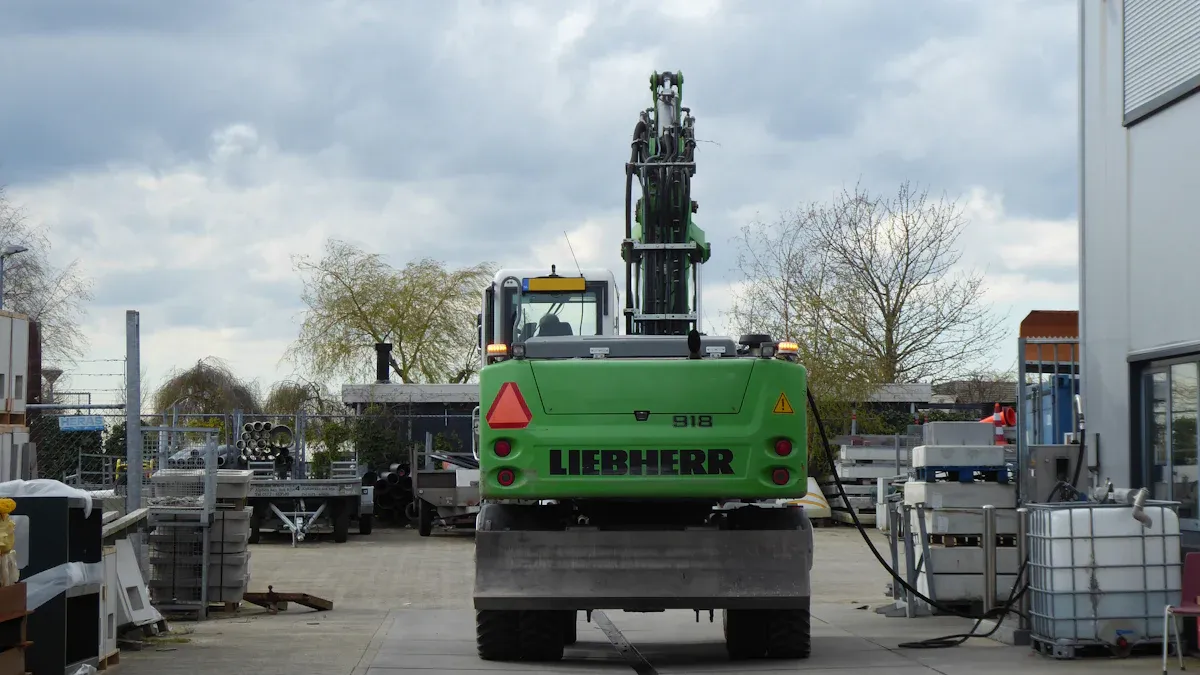
Brand Fit
You need to make sure your hydraulic pump matches your excavator’s brand. Each brand designs its machines with unique parts and connections. If you use a pump that does not fit your brand, you may face problems with installation or performance. For example, a pump made for Caterpillar may not work well in a Komatsu machine. Always check the brand guidelines before you buy. This step helps you avoid costly mistakes and keeps your excavator running smoothly.
Tip: YNF Machinery offers hydraulic pumps designed for many top excavator brands. You can find pumps that fit your machine without worry.
Model Compatibility
Matching the right hydraulic pump to your excavator model is just as important as brand fit. Each model has different needs for flow rate, pressure, and efficiency. If you choose the wrong pump, your machine may not work as it should. Here are some key points to check for model compatibility:
Make sure the pump’s flow rate matches what your excavator needs.
Check that both the pump and your machine can handle the same maximum pressure.
Look at efficiency ratings to help save energy and reduce costs.
Confirm that the hydraulic fluid works with all system parts.
Think about the environment where you use your excavator. Dust, heat, or moisture can affect pump performance.
Choose a pump that keeps noise and vibration low, especially if you work in quiet areas.
When you follow these steps, you help your excavator last longer and work better. Always use the manufacturer’s manual for your model. If you need help, YNF Machinery can guide you to the right hydraulic pump for your specific excavator.
Choosing a Hydraulic Pump
Assess Needs
You need to start by understanding what your excavator does every day. Each job puts different demands on your machine. You should look at several important factors before you choose an excavator hydraulic pump. The table below shows what you need to check:
Factor | Description |
|---|---|
Hydraulic Fluid Viscosity | Make sure the fluid works well with your pump for smooth operation. |
Flow Rate | Check how much fluid your pump must move to match your work needs. |
Power Curves | Look at power needs at different flow rates to help you decide. |
Torque Ratings | Compare the power your pump needs with what your machine can give. |
Maximum Operating Pressure | Know the highest pressure your pump will face to keep it safe. |
Fixed vs. Variable Displacement | Decide if you need a pump that changes flow or one that stays the same. |
You should also think about the attachments you use, like breakers or augers. These tools may need more flow or pressure. Always add up the peak flows for all the tools you use at the same time. This helps you pick a pump that can handle your busiest days.
Tip: Write down your most demanding tasks. This list helps you see what your excavator hydraulic pump must do.
Compare Specs
Once you know your needs, you should compare the specifications of different hydraulic pumps. This step helps you find the best match for your machine. Here are the main points to check:
Flow Rate: Make sure the pump can move enough fluid for your cylinders.
Pressure Rating: Pick a pump with a pressure rating higher than your machine’s maximum need.
Pump Type: Choose between gear, vane, or piston pumps based on your system’s needs.
You should also look at the manufacturer’s guidelines. These rules help you avoid mistakes and keep your machine safe. The table below lists the most important things to check:
Critical Factors | Description |
|---|---|
Quality | High-quality pumps last longer and break down less often. |
Compatibility | The pump must fit your excavator’s system for best results. |
Pressure Capabilities | The pump should meet or beat your machine’s pressure needs. |
Size | The pump size must match your excavator’s specs. |
Environmental Considerations | Pick a pump that works well in your job site’s conditions. |
Experts also suggest a few more steps:
Choose variable displacement axial piston pumps for main circuits and fixed displacement pumps for extra tools.
Find out which functions need the most flow and pressure.
Add up the peak flows and use a diversity factor if you use many tools at once.
Set your system pressure high enough for the hardest job, but not too high.
Make sure your pump can handle all your attachments.
Note: If you feel unsure, always check the manufacturer’s manual or talk to a hydraulic expert. This step helps you avoid costly mistakes and keeps your excavator running strong.
If you want more help, YNF Machinery can guide you in choosing the right hydraulic pump for your needs.
Picking the right excavator hydraulic pump takes a few steps. First, make sure the pump fits your excavator’s flow and pressure needs. Next, check if the pump is tough and made from strong materials. Look at how easy it is to take care of the pump. Think about the price and how long the pump will last. Choose a pump that works well for your job. Teach workers how to use the pump the right way for best results. When you focus on compatibility, efficiency, and maintenance, you can save money and help your pump last longer. If you need help, you can ask YNF Machinery for advice on picking the best hydraulic pump for your needs.
FAQ
What signs show my excavator hydraulic pump needs replacement?
Your excavator may move slowly. You might hear odd sounds. You could see leaks near the pump. The pump may not make enough pressure. If you notice these things, check your pump. Replace it if the problems do not stop.
How do I know which hydraulic pump fits my excavator?
Look in your excavator’s manual for pump details. Find the pump type, flow rate, and pressure. Match these numbers with the pump’s specs. YNF Machinery can help you pick the right pump for your model.
Can I use aftermarket hydraulic pumps safely?
You can use aftermarket pumps if they fit your excavator’s specs. Always check the pump’s quality and if it matches your machine. YNF Machinery has good aftermarket pumps for many brands.
How often should I maintain my hydraulic pump?
Check oil levels and look for leaks every week. Change filters and fluids when the manual says to. Regular care helps your pump last longer.
Where can I buy a quality excavator hydraulic pump?
You can buy strong hydraulic pumps from YNF Machinery. They have pumps for many excavator brands and models. Their team can help you pick the best pump for your needs.
